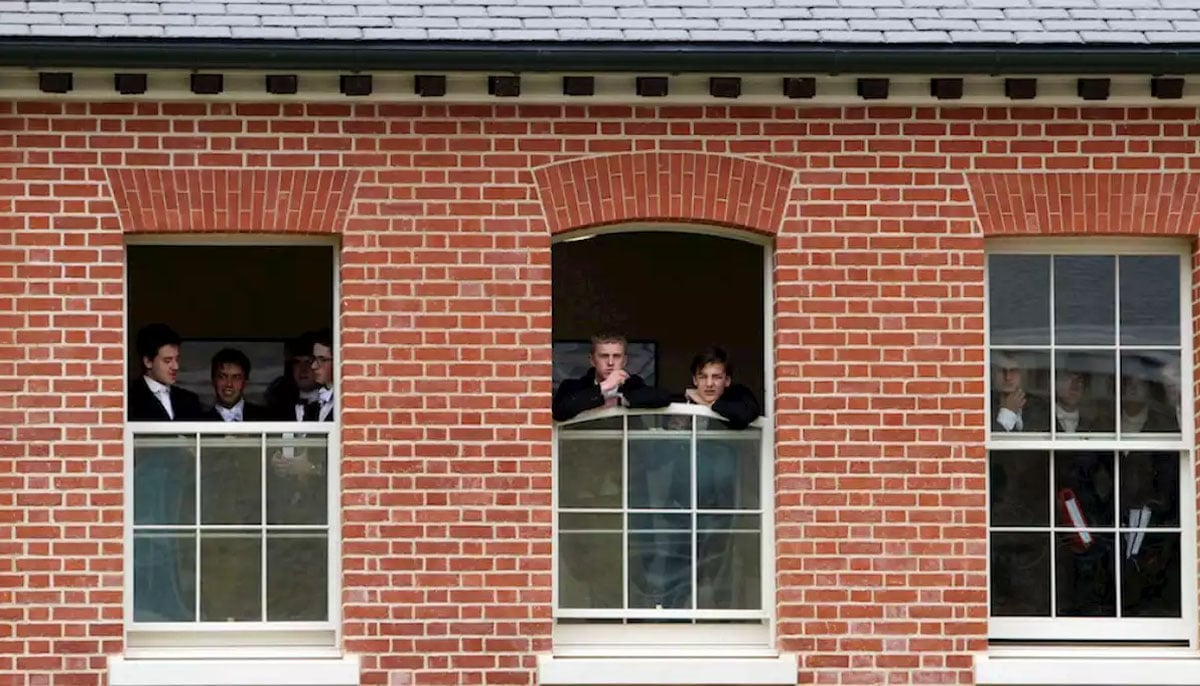Elite UK school Eton to apologise to ex-pupil for racist abuse
LONDON: The head of Britain’s Eton College said on Tuesday he will invite back a black former student to apologise in person for racism he experienced at the top fee-paying school in the 1960s.
Simon Henderson said he wanted Dillibe Onyeama to feel welcome after he was previously banned from visiting Eton for writing a book about the racist abuse he faced there. "We have made significant strides since Mr Onyeama was at Eton but... we have to have the institutional and personal humility to acknowledge that we still have more to do," Henderson said in a statement.
"We must all speak out and commit to doing better -- permanently -- and I am determined that we seize this moment as a catalyst for real and sustained change for the better. "I will be inviting Mr Onyeama to meet so as to apologise to him in person, on behalf of the school, and to make clear that he will always be welcome at Eton."
The school’s move follows anti-racism protests across Britain, sparked by the death of George Floyd, an unarmed black man, during a police arrest in the United States. The demonstrations have focused renewed attention on racism in Britain, as well as the toxic legacy of its colonial past, including calls for it to be taught in schools.
Nigerian writer Onyeama, who graduated from Eton in 1969, wrote a book about his experiences at the exclusive private boys’ school, near Windsor, west of London. The school has become a byword for elitism and Britain’s class divide.
Annual fees cost more than £42,000 ($52,000, 46,000 euros) per year. Old boys include Prime minister Boris Johnson, and princes William and Harry. Onyeama told the BBC he had been taunted on a daily basis by fellow students, and asked questions like "why are you black?" and "how many maggots are there in your hair?"
When he struggled in academics or flourished in sports, the students attributed it to his race, while when he excelled in exams he was accused of cheating, the broadcaster said. After detailing his experiences in a 1972 memoir, he received an official letter informing him that he was banned from visiting Eton.
Onyeama said although the apology now was not necessary, it "compels the recognition that prejudice on the grounds of colour or race dehumanises its victims in a way that ordinary forms of prejudice do not".
Henderson said he was "appalled" to learn of the racist abuse Onyeama faced, and his "absolute priority" was to make Eton an "inclusive, compassionate and supportive community for all".
-
 Alan Cumming Shares Plans With 2026 Bafta Film Awards
Alan Cumming Shares Plans With 2026 Bafta Film Awards -
 OpenClaw Founder Peter Steinberger Hired By OpenAI As AI Agent Race Heats Up
OpenClaw Founder Peter Steinberger Hired By OpenAI As AI Agent Race Heats Up -
 Kate Middleton's Reaction To Harry Stepping Back From Royal Duties Laid Bare
Kate Middleton's Reaction To Harry Stepping Back From Royal Duties Laid Bare -
 Rose Byrne Continues Winning Streak After Golden Globe Awards Victory
Rose Byrne Continues Winning Streak After Golden Globe Awards Victory -
 Ice Hockey Olympics Update: Canada Stays Unbeaten With Dominant Win Over France
Ice Hockey Olympics Update: Canada Stays Unbeaten With Dominant Win Over France -
 Brooklyn Beckham Makes This Promise To Nicola Peltz Amid Family Feud
Brooklyn Beckham Makes This Promise To Nicola Peltz Amid Family Feud -
 Chinese New Year Explained: All You Need To Know About The Year Of The Horse
Chinese New Year Explained: All You Need To Know About The Year Of The Horse -
 Canadian Passport Holders Can Now Travel To China Visa-free: Here's How
Canadian Passport Holders Can Now Travel To China Visa-free: Here's How -
 Maya Hawke Marries Christian Lee Hutson In New York Ceremony
Maya Hawke Marries Christian Lee Hutson In New York Ceremony -
 Glen Powell Reveals Wild Prank That Left Sister Hunting Jail Cells
Glen Powell Reveals Wild Prank That Left Sister Hunting Jail Cells -
 Edmonton Weather Warning: Up To 30 Cm Of Snow Possible In Parts Of Alberta
Edmonton Weather Warning: Up To 30 Cm Of Snow Possible In Parts Of Alberta -
 'A Knight Of The Seven Kingdoms' Episode 5: What Time It Airs And Where To Stream
'A Knight Of The Seven Kingdoms' Episode 5: What Time It Airs And Where To Stream -
 Amy Schumer Drops Cryptic Message On First Valentine Amid Divorce
Amy Schumer Drops Cryptic Message On First Valentine Amid Divorce -
 Savannah Guthrie Sends Desperate Plea To Mom Nancy Kidnapper
Savannah Guthrie Sends Desperate Plea To Mom Nancy Kidnapper -
 NBA All-Star 2026 Shake-up: Inside The New USA Vs World Tournament Format
NBA All-Star 2026 Shake-up: Inside The New USA Vs World Tournament Format -
 Warner Bros Consider Reopening Deal Talks With Paramount, Says Reports
Warner Bros Consider Reopening Deal Talks With Paramount, Says Reports




